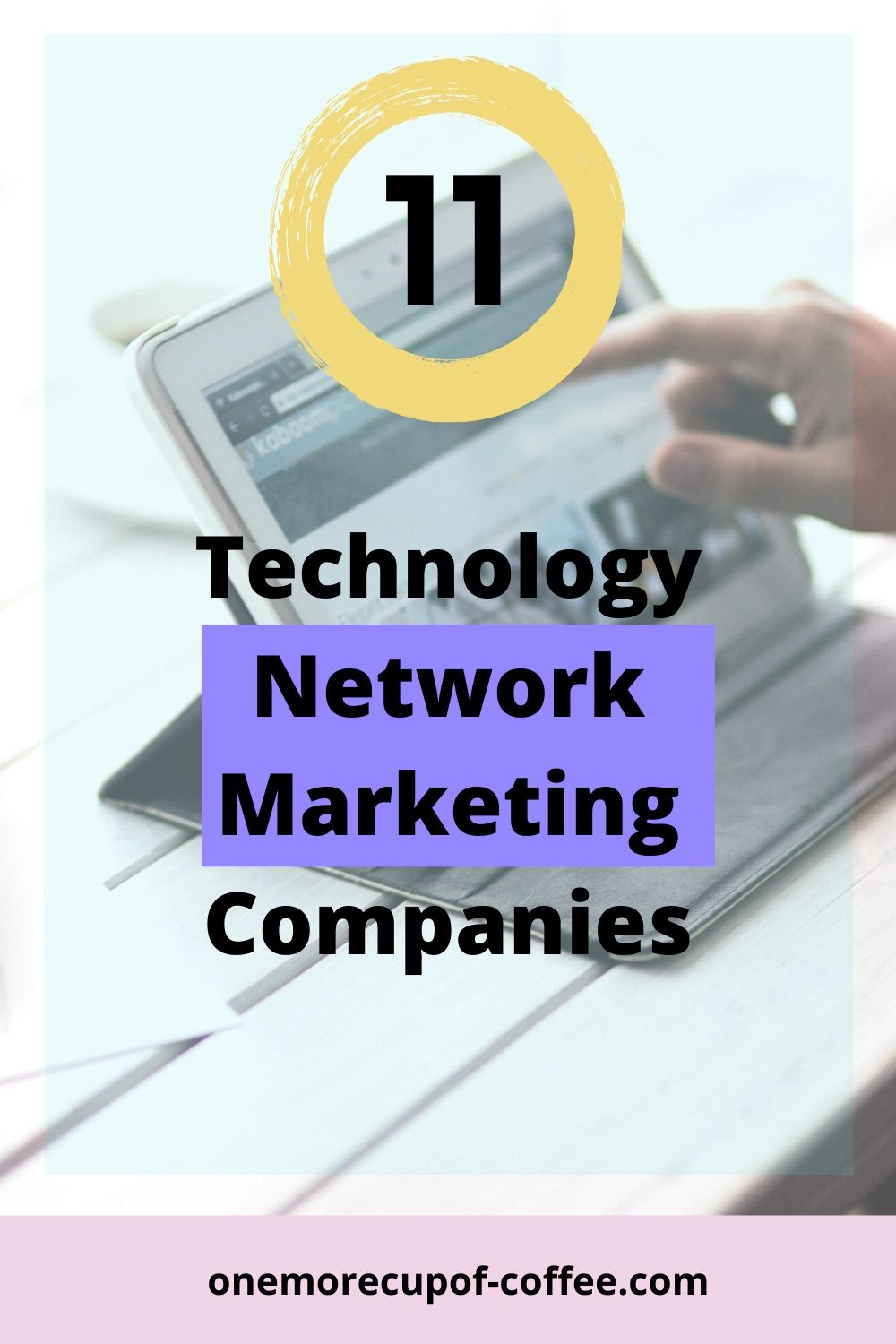
Technology network marketing companies don’t just offer the chance to make money. They’re also an interesting way to stay up-to-date and involved in modern technology, especially products and services that many people may not know about.

Are You Ready To Work Your Ass Off to Earn Your Lifestyle?
Are you tired of the daily grind? With a laptop and an internet connection I built a small website to generate income, and my life completely changed. Let me show you exactly how I’ve been doing it for more than 13 years.
The various companies in this list all follow their own angles. This includes having distinctive product selections and their own goals. Some of them may look familiar, while others are likely to be entirely new.
These are still MLMs, of course, so there are various complexities with how you earn from sales and with the idea of building a team. That’s where this post comes in.
We’re not just highlighting the most significant MLMs that feature technology. We’re also talking about the details of each company, including the products that they offer, their compensation plan and the cost to get started.
After all, it’s no good jumping into a company blind. You’ll have a better chance of success if you know what is involved and use this information to make your decision. Overall, in my experience, network marketing companies are very much behind the curve when it comes to product quality and innovation. Most MLMs, in my opinion, are started by people interested in making money, instead of folks who are genuinely interested in helping people.
For cutting edge products, it’s best to go with companies running a standard affiliate program, and researching specific products for specific needs. You’ll have much better luck promoting solar energy products to a green audience looking get off the grid, or a SEO tools to a small business launching their website, than you will trying to convert family and friends to some of these companies below they may have never heard of.
Technology Network Marketing Companies
- Royaltie
- Youngevity
- World Global Network
- CAN
- IDLife
- Vollara
- Nikken
- Ambit Energy
- Talk Fusion
- Tempo Wireless
1. Royaltie

- Focus: Lead generation technology
- Minimum Cost: $57/month (+ $30 initially)
Product Overview: Royaltie targets small businesses and entrepreneurs, providing what they call ‘lead generation technology’. This is a service that allows people to broadcast ads using across common apps and websites.
Along with this, Royaltie provides the ability to build landing pages and to set up email marketing. The combination of features could be used to promote local businesses or for affiliate marketers to get people interested in products.
There is also a proximity feature to Royaltie, which is the one thing that makes the service stand out. This allows business owners to target specific geographic locations. The ads are then distributed based on the popular websites and apps in those areas.
The overall approach does have some appealing features, but most of these aren’t especially unique. Paying for ads is hardly a new concept. Many of the people who would benefit the most from doing so will be working with ads and not using Royaltie at all.
Royaltie offers three monthly plans for members, Starter Package, Entrepreneur Package and Small Business Package. These cost $57/month, $87/month and $327/month, respectively. The main difference is the number of ad impressions offered.
Customers can also purchase additional ad packs to expand their reach further. A $30 pack offers 5,000 impressions, a $50 pack offers 10,000 impressions and a $200 pack offers 50,000 impressions.
Commission Quick View: Royaltie offers three general ways to make money. The first is an $125 bonus for each time members recruit five customers or affiliates.
The second is recurring monthly income based on the performance of the member and Level 1 & 2 of their team. Unusually, Royaltie offers a flat commission rate for each rank (rather than a percentage).
For example, the first rank requires $100 in sales volume per month. Hitting this earns the member $20 for that month. The next rank has a $200 requirement and earns the member $50.
It’s an interesting style, as you’re never just relying on your own sales (unless you want to). However, it means that you need to make at least $100 in sales to earn commissions.
The team aspect allows members to earn from their Level 3, 4, 5 & 6 members. The style is unusual here too, as members earn a percentage of their team’s success, regardless of the level that team members were on.
The percentage earned is based on the member’s own personal sales. Making one sale in a month means 1% commission, two sales means 2%, all the way up to five sales for 5% commission.
Final Thoughts: Royaltie’s biggest advantage is that it makes ads less confusing for beginners, especially as the company bundles various related services together. This approach does have some advantages, but only for the right audience.
For that matter, your audience is going to be the biggest issue when promoting Royaltie. There simply aren’t that many people who would benefit from being able to advertise like this. Some who would see benefits might already know how to work with ads on their own.
2. Youngevity
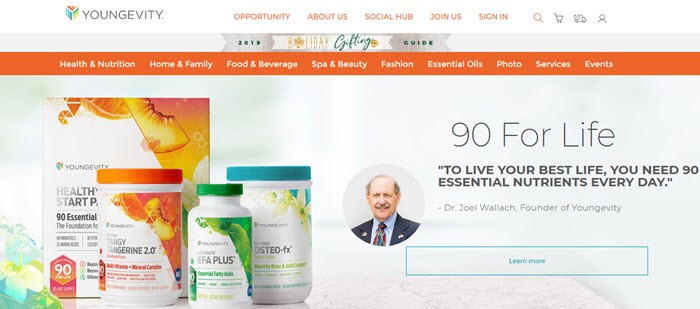
- Focus: Health products, services and other items
- Minimum Cost: $19.95
Product Overview: While Youngevity is a health MLM, the company is also notable for the large selection of products (and services) that they have to offer. This includes health, home, family and fashion items, along with various services for businesses and for the home.
Because this list is focusing on technology MLMs, we’re just going to focus on the services from Youngevity (none of the products are technology based).
There are two sets of services to choose from. The Home services include an online savings portal, discounts on travel and entertainment, tech support, telecare, roadside assistance and identity protection.
The business services cover a broad range, including options like small business loans, cloud services, merchant processing and mobile phones. These might be interesting to promote. Just make sure you find out for yourself whether the services are any good before you start trying to promote them.
Commission Quick View: Youngevity provides up to 30% compensation from sales, but Youngevity doesn’t state what the initial compensation rate is. As such, you might earn less when you first get started.
The team side to the company follows a unilevel design. At the first rank, Associate, members earn 5% from their Level 1 and 5% from their Level 2, which is actually pretty good.
Increasing the commission rate and depth involves progressing up through the ranks with Youngevity. Each rank comes with its own requirements. The requirements can include hitting personal and team sales volumes, along with having some of your team members hitting specific ranks.
Your ongoing requirements also increase with ranks. This means that you need to hit higher sales targets as you go. If you fail to hit those targets, then you lose the ability to earn from your team for that month.
Final Thoughts: The services from Youngevity might be interesting, but they’re also a little odd. It’s hard to imagine many people wanting to purchase such services from an MLM, especially a health MLM.
3. World Global Network
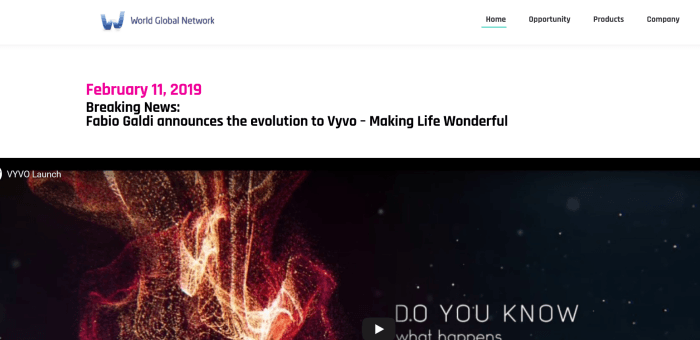
- Focus: Health technology
- Minimum Cost: $359
Product Overview: World Global Network focuses on the idea that technology can help people to monitor and control their health. One of their main product lines is called HELO.
HELO devices are worn like a wristwatch. The general idea is similar to a FitBit, but World Global Network has tried to go beyond the features of FitBit and other brands.
For example, the devices (there are three versions) have a non-invasive method of monitoring blood sugar levels. They also use an open API, which should allow for third-party app development.
The devices also use germanium as a conductor. This element is an antioxidant and is thought to offer benefits for wellness. The evidence for such benefits isn’t amazing, but the device still has plenty of advantages even if the stones didn’t do much at all.
Another interesting product is BioZen. This is a small device that is designed to diminish the radiation that comes from your cellphone. The area is a hot topic and it’s easy to imagine that customers would be interested in the item.
Commission Quick View: While the products make World Global Network sound interesting, their compensation plan isn’t nearly as appealing. The company offers just 10% commission on sales, with no way to increase the rate.
To make matters worse, the team aspect follows a binary design. This style involves building two teams and attempting to balance them. If one team dramatically outperforms the other, then your income may be capped by the team that does poorly.
Interestingly, World Global Network allows you to earn 10% or 20% from your Team Volume Commission. The term refers to the volume that both teams share (i.e. the amount that your least successful team earns).
The compensation plan gets difficult to read in places, as there is so much going on. This type of complexity can lower your ability to earn by making it unclear how to maximize your income.
Final Thoughts: The low compensation rate from World Global Network is reason enough to avoid the company. To get around this, you’d need to build a decent team and ensure that they made sales. Doing so could be tricky, as potential recruits could easily be put off by the 10% commission rate.
4. ACN
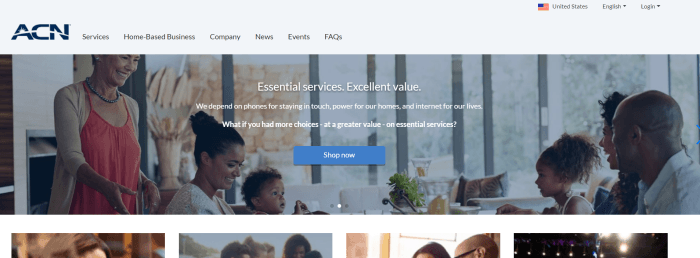
- Focus: Various technology-based services
- Minimum Cost: $499
Product Overview: ACN is a service-focused company, with a mixed reputation online. They offer various services that could be considered essential, like home phone, high-speed internet, wireless and more.
The idea is that you make money by promoting services that people need regularly. However, ACN doesn’t seem to be providing these services themselves.
The company acts as a retailer instead. For example, people who want high-speed internet can end up getting it through AT&T, Spectrum or Frontier. With some other services, ACN is just promoting one potential provider.
ACN’s style is a little odd, as the benefits of ordering through them aren’t clear at all. Take AT&T as an example. Why bother going through ACN when you could sign up yourself?
ACN provides very few details about some of the services and more about others. Some of them might be competitive, but it’s difficult to be certain.
It’s also worth noting that ACN itself doesn’t get great reviews online, nor do the services promoted. After all, customers end up going through a middleman to order a service. It’s easy to see how that could get complicated if there were any problems further down the line.
Commission Quick View: The commission plan from ACN isn’t encouraging either. Members start off earning just 1% commission on most sales. This can increase to 3%, 5% and then 10% based on the number of Personal Customer Points that the member obtains.
Personal Customer Points are based on the services that people buy, but not on the amount that they spend. This could easily leave you trapped on a very low rate of commission, even if you’re making a decent amount of sales.
The team aspect follows a unilevel plan. It relies on the Personal Customer Points angle as well. This time, the number of points determines how many levels a person can earn from in their downline.
Having 10 points allows you to make 1/4% from your first level and your second level (Yes, I did write that correctly. Quarter of a percent!). With 25 points, you can also earn 1/4% from your third level and 1/2% from your fourth level.
The numbers get a little better after that point, but they’re still not great. Besides, most people will never get that far into their downline. Getting so many levels requires a broad audience.
How many people are really going to want to switch to a new service provider? You’d have to be convincing to get them to change – and ACN doesn’t give you much to work with.
Final Thoughts: The range of services is really the only thing that ACN has going for it. The company might be viable if you could make enough high-priced sales, but don’t hold your breath. Most members would be fighting an uphill battle to get anywhere.
5. IDLife
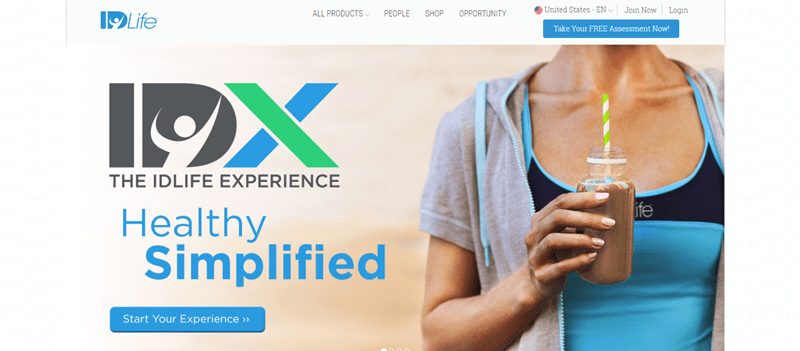
- Focus: Health and supplements
- Minimum Cost: Free
Product Overview: IDLife is a health and wellness company, so it might seem like an odd inclusion on this list. In fact, most of the company’s products have nothing to do with technology at all. They include things like protein shakes, supplements and energy powders.
The technology angle is related to one product. This is called the IDLife Nutrition and Fitness DNA Test. The test is quite literally what the name suggests.
IDLife charges $249.99 for the DNA test. They don’t just test DNA either. The information is then used to provide a variety of information, such as your weight predispositions, metabolism, exercise response and dietary needs.
It’s a clever idea. Personalized nutrition is a trending topic right now, so the test could be a good way to inspire sales. The service is also unusual. This should help to get people interested in the DNA test and in IDLife itself.
Commission Quick View: IDLife has an unusual starting approach. You can either sign up with a product-based kit (for $199.99 or $299.99 depending on the kit that you choose) or you can sign up for free.
The free approach gives you some digital information and a replicated website for a month and that’s it. You also just get 10% discount on sales. The most notable part is that you cannot earn commissions.
Instead, you need to sell either 500 personal volume of product or two of the product-based starter kits). Once you hit either of those goals, you become a fully-fledged associate and can start to make money.
If you sign up with a product-based kit, you skip those initial sales target needs. Instead, you get 30% discount on product purchases and can earn commissions immediately.
As for the commissions themselves, there are two approaches here as well. The first is to buy and resell the products. This means some risk on your part, but customers often love the idea of getting products as soon as they pay for them.
You can also sell through a replicated website. Doing so means less stress and less risk.
The team aspect follows a unilevel model, which is the most common style. Under this model, you earn residual commissions from the team members in your downline. This starts off at 5% for the people that you directly recruit.
The depth that you can earn commissions from increases as you work your way up through the ranks in IDLife.
Final Thoughts: IDLife is interesting. The compensation plan is better than many and gives you two options for how you get started. The DNA test side of things is also appealing. Even so, it would be important to think about your audience and whether the products are likely to sell.
6. Vollara

- Focus: Air purifiers, water purifiers and other health items
- Minimum Cost: $29.99
Product Overview: Vollara is another company that approaches health from a technological perspective. Their main products include a water filter and a collection of air filters.
The prices aren’t available on Vollara’s website. Instead, visitors are told to talk to distributors to find out specifics about the products and to get prices. Information from other sites suggests that customers can expect to pay more than $1,000 for some of the products.
There is also a random collection of other products, including a device that helps to prevent electrical spikes, a radiant heater and a stain lifter. Again, pricing details aren’t provided.
The final set of products is more familiar – supplements. Vollara has some rhetoric for why these are good for health. Still, with so many supplements on the market, there’s nothing particularly amazing about the selection here.
Commission Quick View: Vollara follows a purchase-first model. This means that you need to buy the products at a discount and then resell them.
The style always comes with risk, as you can’t be certain that you’ll be able to make sales. To make matters worse, many of the products from Vollara seem to be expensive.
Vollara provides little information about retail sales, so it’s not clear how much commission you’ll end up earning once you buy and then resell. Without that information, it’s hard to know whether the income from Vollara is reasonable for the amount of risk and effort.
Beyond this is the typical ability to earn from your team. Vollara approaches this in an unusual way. At the early ranks, distributors only get to earn Fast Start and Team bonuses. There is no residual team commission.
Distributors only start to become eligible for residual commissions once they hit the 7th rank in the company. That’s pretty rough, as most distributors aren’t going to get that high.
There is also an ongoing sales/purchase requirement of 100 PQV at the lower ranks and 200 PQV at the higher ranks. This is a monthly requirement, so you would need to consistently make sales. Failing to do so would prevent you from earning based on your team’s success.
Final Thoughts: Vollara would only be a good choice for people who were seriously passionate about the products. Even then, the main products tend to be expensive and controversial. That’s not setting you up well for sales, especially as the goal is to purchase the products and then resell them.
7. Nikken
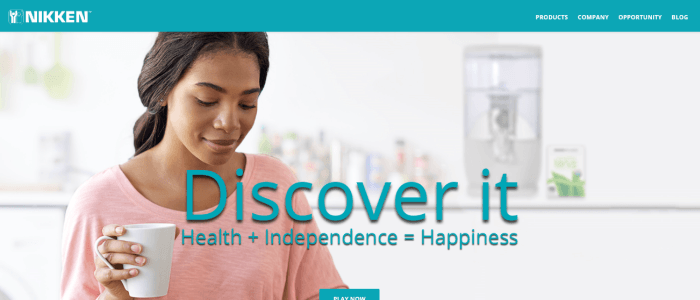
- Focus: Health, magnets and sleep
- Minimum Cost: $49
Product Overview: Nikken offers four categories of health products: Nutrition, personal care, rest and relaxation and environment. While some of these categories sound typical, most of the products from Nikken are a little bit unusual.
Let’s start with the nutrition items. These are mostly supplements and have similar claims to ones that you will find from other companies. But, there is a stronger reliance on herbs and unusual formulations.
The rest and relaxation category includes items to help promote sleep, insoles, support wraps and various items that are meant to provide ‘magnetic support’. The environment category includes an air purifier, a water bottle and a shower system.
The personal care items are probably the most familiar entries on the list. This section includes a small range of skincare items.
All-in-all, the product selection is different to any other MLM out there. Some of the items do strongly rely on technology, such as the KenkoTouch massager and the air purifier, while others don’t.
Reviews for the products are mixed and there aren’t many trustworthy ones out there. The reliance on magnets is also a bit concerning. There isn’t much evidence that these offer any tangible benefits.
Commission Quick View: Nikken distributors earn 25% commission on all sales. The main approach is to purchase products at wholesale and then resell them at the retail price.
Distributors are also provided with a replicated site. This provides the chance to make sales without needing to purchase the products first. Having both options is nice, just be aware that replicated sites can be frustrating and won’t rank in search engines.
Once you start to build a team, there is also a personal rebate. This can get as high as 20% of your personal commissionable sales volume. Nikken’s compensation plan doesn’t explain what this rebate is or how it works, but it may offer the chance to get more products for the money that you spend.
The team aspect starts off with a 5% override on your personal group’s sales. This increases up to 20% as you move up through the ranks. The later ranks provide other income opportunities, including a shallow binary model that provides residual commissions on sales.
In the end, the compensation plan is simpler than most, especially if you stay in the early ranks. The approach could mean that your income potential is lower too. Still, you get to earn from the sales of your team as a whole, which is a useful feature.
Final Thoughts: Nikken does have some advantages. The products are unusual (to say the least!) and some of them are relatively expensive. The price means that if you did make sales, the potential commission per sale could be decent.
While there is income potential, it’s important to consider the products carefully. While these may appeal to some customers, others may have no interest at all. If nothing else, it might take strong sales skills to convince people that magnets offer health benefits.
8. Ambit Energy
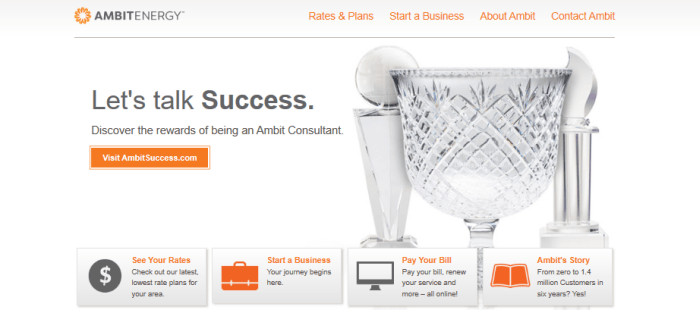
- Focus: Electricity and gas
- Minimum Cost: $75
Product Overview: Ambit Energy is, quite simply, an energy provider. There are a few other MLMs in this field, but Ambit Energy is different in that it actually looks and feels like a traditional energy business.
This means that the service is roughly what you might expect. Customers pay monthly for the energy that they use. Reps for the company are responsible for signing customers up to begin with.
One serious problem is that there are many negative reviews for the company. I’m not just talking about people complaining at the MLM side of things either.
For example, some users mentioned that their power bill was much higher than with any other company and that there was an unexpected termination fee. It seems that Ambit reps regularly claim that customers will get very low energy prices, which isn’t something that can really be guaranteed.
Selling energy through an MLM is also problematic. The cost of energy can vary dramatically based on many factors. Even if Ambit Energy’s prices were good, it’s easy to imagine that customers would get angry off at you if their bills were high.
Commission Quick View: The compensation plan for Ambit Energy mentions that you earn from recruiting customers initially and also receive residual income from their monthly bills.
The initial income isn’t so impressive. For example, Jump Start Level 1 provides $100 – if you get five customers in four weeks (which seems pretty unrealistic). There is $400 available overall as Jump Start bonuses and you need a total of 30 customers (in 12 weeks!) to get all of the bonuses.
Most of your income appears be come from the monthly Customer Residuals. Ambit Energy provides rates for different kWh/month tiers, but it’s difficult to know what these mean in practice.
Realistically, the amount you earn would strongly depend on the amount of energy that your customers used. The compensation plan from Ambit Energy doesn’t provide good examples, so the income potential isn’t clear at all.
There is also a typical team-based approach, where you are earning from your downline. The plan here seems to be a unilevel one, where you earn residual commissions based on where people fall in your downline (i.e. who recruited who).
Ambit Energy only has four ranks in their compensation plan, which makes this a much simpler opportunity than many others. Even so, it’s still not clear how much you’re actually going to make as a rep for the company.
Final Thoughts: Ambit Energy doesn’t do itself any flavors with its compensation plan.
But, even if the income potential was decent, I’m not convinced that you could get customers regularly. People don’t seem happy with the prices from Ambit Energy and there are many other energy companies out there to choose from.
9. Talk Fusion
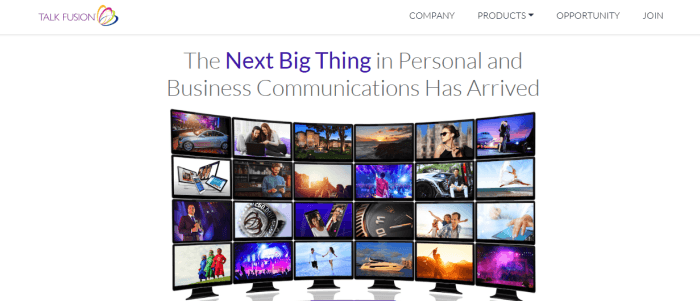
- Focus: Personal and business communications
- Minimum Cost: Unknown
Product Overview: Based on their marketing, Talk Fusion offers ‘cutting-edge video communication products’. Their main items are products for video email, video newsletters, video chat, live meetings and sign up forms.
You might have already noticed one issue with this idea. None of the products are really cutting edge. Some of them aren’t even that unusual.
Admittedly, the video email and video newsletter products are less common, but this isn’t an area of high demand either. I mean honestly, both ideas feel gimmicky. I can’t imagine that many people would use these concepts in practice.
Perhaps some specialized marketers might use them, but Talk Fusion is an MLM. You’re meant to be getting many customers on board. The product selection just doesn’t seem to support that idea.
The pricing is frustrating too. The first option is to just buy video email. This costs $99 and then $10 per month. Customers only get a single template for that price. There’s a video suite too, which provides all of the products for $249 and then $25 per month (you’re still only getting one video email template).
The final option is Pro, which provides all the products, unlimited templates and private label rights. That version costs $1,499 and then $50 per month. Good luck trying to sell that version.
Commission Quick View: Basic commissions from Talk Fusion are called Fast Start Bonuses. The compensation plan mentions that members earn $20 for selling an Executive Package, $60 for selling an Elite Package and $120 for selling a Pro Package. There is also a bonus of $10 a month when people maintain their membership.
However, Talk Fusion doesn’t appear to sell those particular packages anymore, so it’s unclear how much you’re going to earn from sales.
Talk Fusion uses a binary model for team commissions. Each time you hit at least 100 in Group Sales Volume for the left and the right the team cycles and provides a commission of $25.
To earn from your team, you need to be qualified. This involves hitting the minimum sales requirement every month. You also need to have an active associate on your left and right team or one active associate and one active customer.
There is also a matching bonus. This provides 10% team commissions for people who you sponsor personally. This is a surprisingly easy bonus to hit and would add to your income potential.
There are also, of course, plenty of more complex bonuses. Some of these provide considerable income, but the odds of hitting of them are pretty slim.
Final Thoughts: The biggest limitation with Talk Fusion is the product selection. The products simply don’t sound that good and the potential audience would be limited.
Besides, most people aren’t going to be keen on paying a monthly fee to retain access to the products.
10. Tempo Wireless
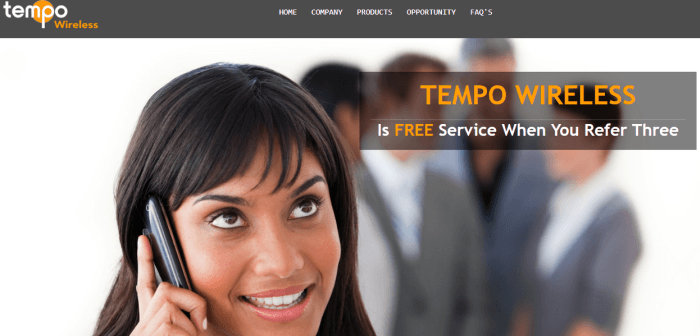
- Focus: No contract wireless
- Minimum Cost: Free initially, then $50/year
Product Overview: Tempo Wireless basically provides a no contract wireless service. They have three CDMA Service Plans, which cost $44.95, $49.95 or $64.95. There is also a set of GSM Network Service Plans, ranging from $20 to $69.95 and Sprint Network Service Plans that are priced similarly to the GSM plans.
The services differ in the features that they provide, such as the number of minutes, the amount of data, the rates and the cost for additional lines.
Beyond this, there is a Home and Office service that costs $29.99 per month – although there are few details about what you get for that price. Mobile phones can be purchased through the company too.
Most reviews for the company focus on the MLM opportunity rather than the wireless services that are provided. Still, it’s hard to be enthusiastic about what Tempo Wireless offers.
You’ll probably find that most people would prefer to go with a company that they trust, rather Tempo Wireless. Besides, the Tempo Wireless site isn’t very encouraging and doesn’t look particularly professional.
Commission Quick View: There are two aspects to the compensation approach from Tempo Wireless. The first is that distributors earn a set fee per sale based on their rank and the type of sale.
At the earliest rank, a distributor will earn $13 for any new cellphone customer, $10 for a home phone customer and $4 for a lifeline customer. This might not sound like much, but it’s only part of the equation.
You also earn residual income based on the bills of your personal customers. This ranges from 1% to 10%, depending on your Personal Customer Billing Volume.
Unfortunately, you just earn 1% until you can hit more than $1,249 in customer bills. After that point, you’re earning 4% instead. These percentages are very low. Even when you consider the initial payment per sale, you’re still earning less than with many other companies.
Beyond this area is the team side of the commission plan. There are eight levels and you earn between 1% and 4% residual commissions. The percentage is based on your rank and the number of customer points.
There are some other bonuses, but none of these are particularly unusual.
Final Thoughts: The commission from Tempo Wireless ends up being pretty low and the service isn’t that competitive. Even if some of the prices end up being better than competing companies, you’d be hard pressed to get customers to trust an obscure MLM with their wireless plan.
Top Pick
Our top choice from this list has to be IDLife. While this is yet another health and wellness company, they do rely on technology through their DNA test. This area helps them to stand out, especially as personalized nutrition is becoming a popular area.
The company’s compensation plan isn’t too bad either. You’re earning 30% commission on sales and can sell through a replicated website (or by buying and reselling).
Just be aware of the sign up options. If you sign up for free, you need to make some sales before you can earn commissions. Still, this style gives you the chance to find out whether you can make regular sales, before you sink any money into the company.

MLM Critic & Author: Nathaniell
What's up ladies and dudes! Great to finally meet you, and I hope you enjoyed this post. I have to be honest though. I'm not a big fan of MLM. Tried it. Hated it.
Affiliate marketing is cheaper, faster, and easier. See for yourself and join millions of other successful affiliates generating income from their blogs!
No inventory. No fees. No recruiting. 3 BILLION potential buyers online.


 Can You Really Make Money Chatting Online?
Can You Really Make Money Chatting Online?
Leave a Reply